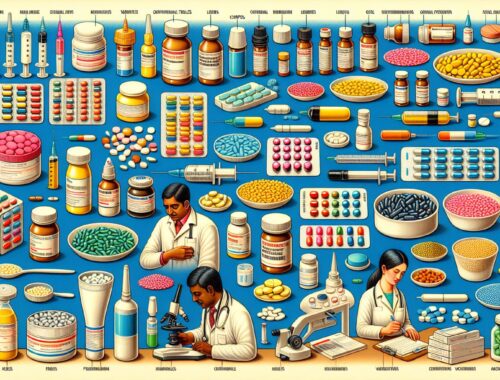
Different Types of Medicines: Understanding Your Options
Medicines have been an integral part of our lives for centuries, helping us combat illness, manage symptoms, and improve our overall well-being. With advancements in medical science, the pharmaceutical industry has boomed, resulting in a wide array of different types of medicines. Understanding these various options is crucial for individuals seeking appropriate treatment and making informed decisions about their health. In this article, we aim to shed light on the different categories of medicines that exist, providing a comprehensive overview of their purposes and benefits.
Introduction to Medicines
Medicines can be broadly classified into several categories, each designed to target specific ailments or conditions. These categories include:
- Prescription Medicines: These medicines are authorized by healthcare professionals, such as doctors, who evaluate the patient’s condition and determine the most suitable treatment. Prescription medicines are typically used to treat chronic or severe illnesses.
- Over-the-Counter (OTC) Medicines: Unlike prescription medicines, OTC medicines can be obtained without a doctor’s prescription. They usually treat common ailments like headaches, fever, or muscle pain. However, it is essential to follow the recommended dosage and consult a pharmacist if unsure.
- Natural or Herbal Medicines: Derived from plant extracts, natural or herbal medicines have gained popularity due to their perceived organic and holistic composition. These medicines are believed to have fewer side effects, appealing to those seeking alternative treatments.
- Supplements and Nutraceuticals: Supplements, such as vitamins and minerals, aim to fulfill nutritional gaps in our diets. Nutraceuticals, on the other hand, are products derived from food sources that provide health benefits beyond basic nutrition.
- Homeopathic Medicines: Based on the principle of “like cures like,” homeopathic medicines use extremely diluted substances to stimulate the body’s natural healing mechanisms. Although widely used, its effectiveness is a subject of ongoing debate among medical professionals.
- Biologic Medicines: Biologics are made from living organisms, including human cells, animals, and microorganisms. They are often used in advanced treatments for conditions like cancer, autoimmune diseases, and genetic disorders.
How Medicines Work
Medicines work in diverse ways, depending on the nature of the ailment they are targeting. While some medicines directly attack pathogens, others alleviate symptoms or regulate bodily functions. Here are some common mechanisms of action:
- Antimicrobial: Antibiotics, antivirals, and antifungals eliminate or inhibit the growth of microorganisms, effectively treating infections.
- Anti-inflammatory: These medicines help reduce inflammation caused by conditions like arthritis, allergies, or injuries.
- Analgesic: Analgesics, commonly known as painkillers, relieve pain without addressing the root cause.
- Hormonal: Hormonal medicines regulate the body’s hormonal levels to treat conditions such as hormonal imbalances, contraception, or menstrual problems.
- Immunosuppressant: These medicines weaken the immune system, preventing it from attacking its cells or organs, commonly used in organ transplants or autoimmune diseases.
Conclusion
From prescription medicines to herbal remedies, the world of medicines offers a vast range of options catering to various health needs. Understanding the different categories and mechanisms of action allows individuals to make informed choices and collaborate better with healthcare professionals. It is crucial to consult healthcare experts, such as doctors or pharmacists, before starting any medicine and to follow their guidance throughout the treatment process. Remember, everyone’s health journey is unique, and the appropriate choice of medicines can significantly impact well-being and quality of life.
You May Also Like

Exploring the Different Types of Medicines
April 2, 2024
Exploring the Different Types of Medicines
February 20, 2024

